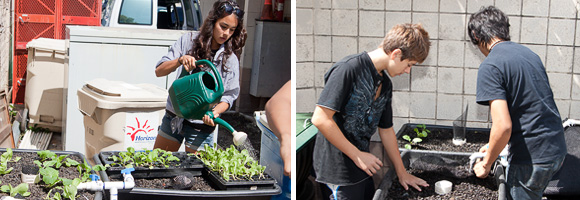
Programs in science include
 Developmental Approaches in Science, Health, and Technology, DASH
Developmental Approaches in Science, Health, and Technology, DASH Foundational Approaches in Science Teaching, FAST
Foundational Approaches in Science Teaching, FAST The Fluid Earth and The Living Ocean, FELO
The Fluid Earth and The Living Ocean, FELO
(part of Hawai‘i Marine Science Studies Program or HMSS)- School Web of Instructional Media, SWIM
Program & Curriculum
Project Briefs
Developmental Approaches in Science, Health & Technology (DASH)
DASH program is for grades kindergarten through 6. It is an integrated, sequential, comprehensive, inquiry-based program that begins with basic concepts, makes practical connections, and crosses subject areas. In each DASH activity, students build an understanding of basic concepts and skills and create a real product as evidence of what they learn. Every grade has a teaching guide with activities for students, support materials for teachers, and sections for families and school administrators. All DASH materials conform to the new standards in science education. DASH teachers are fully trained with both institutes and continued support programs. Teachers attend a 10-day teachers’ institute where they (a) participate in the same activities and inquiries and create the same products their students will in their classes; (b) learn to use the variety of teaching behaviors used in the DASH program; and (c) analyze the DASH learning, teaching, and assessment model through reflective and in-depth discussions.
Foundational Approaches in Science Teaching (FAST)
A middle school general science program built on a constructivist model of instruction delivered through a sequence of laboratory experiences that enable construction of foundational concepts underpinning modern science. Content covers basic physics, chemistry, earth science, biology, astronomy, ecology, and epistemology. The program is aligned with NRC’s National Science Education Standards. Components consist of a student book, science record book, an assessment system, a program articulated resource library, and a teacher’s guide for each each of three levels of FAST. A program specific professional training is required of teachers. Duration of training is approximately 40–80 hours depending upon hours per day and the use of other out-of-classroom components. University of Hawai‘i and PDE3 credit are available.
The Fluid Earth and Living Ocean (FELO)
A high school marine science curriculum built on a constructivist model of instruction. Will be delivered through a sequence of laboratory experiences that enable student construction in the basic concepts of marine biology, ecology, physics, chemistry, earth sicence, and technology. The program is aligned with the NRC’s National Science Education Standards. Materials will be in monograph and digital forms. A program specific teacher professional training will be available.
Physics, Physiology & Technology (PP&T)
A high school physics curriculum built on a constructivist model of instruction. It is delivered through a sequence of laboratory experiences that enable construction of fundamental concepts underpinning modern physics. Content covers mechanics, energy, hydraulics, sound, light, electricity, magnetism, and technology. The program is aligned with the NRC’s National Science Education Standards. Materials will be in monograph format on CD which will include a system of assessment and a teacher’s guide. A program specific teacher professional training will be required of teachers. Duration of training—80 hours. University of Hawai‘i credits are available.
Teaching Science as Inquiry-Aquatic Science (TSI)
A professional development workshop to introduce the Fluid Earth and Living Ocean constructivist inquiry approach to high school teachers. Duration of workshop is variable; ideally 2–3 school days. University of Hawai‘i and PDE3 credit are available.
Reports & Samples
 DASH AAAS Alignment, Gr K-5
DASH AAAS Alignment, Gr K-5
 DASH & FAST AAAS Alignment, Gr 6-8
DASH & FAST AAAS Alignment, Gr 6-8
 FAST AAAS Alignment, Gr 6-8
FAST AAAS Alignment, Gr 6-8
 FAST and HMSS AAAS Alignment, Gr 9-12
FAST and HMSS AAAS Alignment, Gr 9-12
 DASH HCPS II Alignment
DASH HCPS II Alignment
 FAST HCPS II Alignment, Gr 6-8
FAST HCPS II Alignment, Gr 6-8
 DASH NSES Alignment, Gr K-4
DASH NSES Alignment, Gr K-4 DASH and FAST NSES Alignment, Gr 5-8
DASH and FAST NSES Alignment, Gr 5-8
 FAST NSES Alignment, Gr.5-8
FAST NSES Alignment, Gr.5-8
 FAST and HMSS NSES Alignment, Gr 9-12
FAST and HMSS NSES Alignment, Gr 9-12
 FAST Summary of Evaluations
FAST Summary of Evaluations
 DASH Summary of Evaluations
DASH Summary of Evaluations
